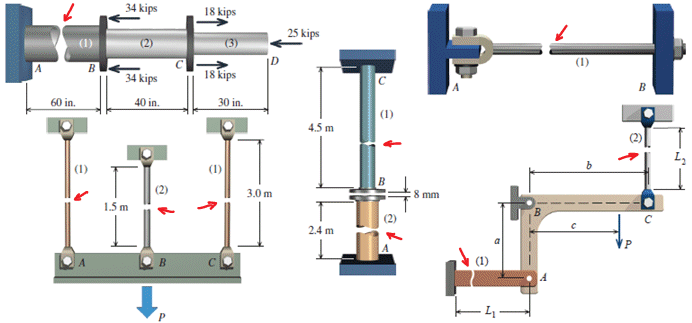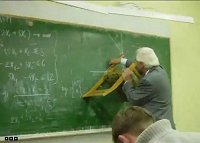See the Grades section on the policies page.
We can look at your particular version of the quiz in my office. You are welcome to look at the papers you wrote on until the next quiz is given. At that point I discard the papers from the previous quiz.
What is the best way to communicate with you?
In class or through email. The topics in this class are very visual. Sketches and equations are the fundamental forms of communication, and it is difficult to convey such information through a phone conversation or text message.
The most efficient and effective way of asking questions about homework is to ask me in person at the study sessions or email me a photograph (or scan) of your work. I can draw/write on the image and send it back. DOC, GIF and JPG are the most convenient file formats for me. PDF is more difficult to edit.
My office phone forwards voice messages to email. If my office door is open, you are welcome to drop in.
How quickly do you respond to messages?
I check email throughout the day but generally only respond to urgent messages during the day. I find it most efficient to answer all other messages only once or twice per day, generally in the evenings once my kids are asleep. I try to respond within 24 hours, but it sometimes takes longer.
What do the cuts in the following images represent? Do they mean that the structures are broken? No. They represent that the images are not drawn to scale. Note the dimensions in the top-left structure. See how the 60-inch portion is drawn shorter than the 40-inch portions? The cut also helps visually remind people the 60-inch portion is hollow.
How quickly are grades posted?
Quiz scores appear in Blackboard as soon as you finish each quiz. Semester grades may take up to a week before appearing in Blackboard.
What's the deal with no partial credit?
First, I believe engineers get paid to solve complex problems. If you can't (correctly) solve problems, you will have a harder time making a living, so I want you to start practicing now.
Second, I spent several semesters designing the quiz format to approximate the way teachers assign partial credit. Teachers typically divide long problems into parts, assign points to each part, and then deduct that value for anything incorrect in a particular part. For example, a four-problem exam typically has 25 points per problem. If the solution to one of those problems requires 5 equations, then each equation might be worth 5 points. If you mess up one equation, then you receive 20 out of 25 points. If you mess up two equations, then you receive 15 out of 25 points. Etc. I try to write the quiz questions such that they require only one or two equations.
I have found that those that complain about partial credit, once they are accustomed to my quizzes, often have misconceptions about how grading is done. They believe that teachers infinitely divide up problems and assign points for the tiniest things. That would be nice, but teachers usually don't have enough time (or desire) to do that.
One of my former colleagues compared his method for manually grading to this quiz format and found that the class average was nearly identical.
Some people believe that I use this technique because I'm lazy. Traditional four-problem exams take only a few minutes to create (pick four problems from the book to photocopy) but several hours to grade. This format takes several hours to create (rewrite the problem statements to make shorter questions, modify the images, program the equations, create several versions of each problem, upload to Blackboard) but no time to grade. The total effort for both approaches is pretty similar. My reasons for switching are...
- students can almost instantly recognize when they've made a mistake
- The quiz choices are accurate to three or four significant figures. If your answer does not match to this level of precision, then you know to look for a mistake.
- students get their scores immediately, instead of a week later
- Most of the teacher's effort takes place before the quiz instead of afterwards.
- the scores are not subjective
- There is no preferential treatment due to handwriting, choice of symbols, how well the instructor understands your thoughts...or simply likes you.
- the technique provides more data on what students do and don't understand and therefore helps with course adjustments
- Having four four-problem exams and an eight-problem final gives the teacher 24 data points to look at, but each problem covers multiple sub-topics, and it's hard to know from the 24 scores which sub-topics were well understood and which were not.
- The multiple-choice quizzes and final exam have over 150 problems, and there are several versions of each. This provides a large amount of data each semester, and each problem generally only covers one sub-topic.
- the technique is scalable for larger class sizes and might someday allow more non-traditional students to take the course
What's the best way to study for this class?
- Go through the textbook, MecMovies, or online videos to learn concepts.
- Attempt the homework problems, but leave portions unfinished that you are not sure about. The more efficient students will often write a short note in the margins to remind them of what they were unsure about.
- Ask questions during class time. Ask me. Ask a study partner. A one-minute explanation is usually all it takes, and that is much faster than trying to figure it out by yourself.
- I suggest that people finish the homework at least 24 hours ahead of time, do a quick review of the homework, and then compare them to some of the problems that weren’t assigned. Ask yourself: How could the question be asked differently? How could it be shortened or split into multiple questions? What makes this problem different from the ones around it in the book? Etc. There are other things you could do (skim the book, review the MecMovies, etc), but I think asking what-if questions with the textbook problems is the best bang for your time.
No. Finals are usually required for multi-section courses. Doing so usually guarantees that the teachers stick to the same schedule, assignments, etc. (i.e. students are treated the same regardless of which teacher they have) because administrators can compare the section averages.
How long have you taught here?
I started teaching full time in 1996 when I was 24. I love the job. It's challenging but flexible and allows my wife and I to live close to both of our families.
Why don't you collect handwritten homework?
I quit collecting handwritten homework when solutions manuals became so readily accessible. Too many people just copy what they see and learn nothing. WileyPLUS problems are unique to each student and offer a better estimate of how well someone understands the topic.
You might not believe it, but most faculty around here work 60 to 80 hours each week...and don't get paid overtime. They most likely wouldn't be here if they didn't like interacting with sharp students, developing new ideas and gadgets, etc. I averaged 12-hour days (sometimes 8, sometimes 16) plus weekends before I had children. I have to work more efficiently now.
If you want to impress a teacher (me), act like you want to learn (most faculty LOVE to learn), do the work he/she asks you to do (most teachers put in at least double that amount of effort preparing for class), ask questions that he/she has never thought about (give them a new idea to chew on), and/or share a story of how you have experienced or plan to experience the topic in your own life (this testifies to how well you understand something...or at least want to understand it).
Why are the quizzes so hard...have so many questions?
Having only a few questions means each one is worth a lot of points and will have a larger impact on your grade if you make a mistake. Having too many questions means you may not finish. So I try to find a good compromise. I try to make sure I can work each quiz in about 15 minutes. Usually those that have put in the proper amount of effort studying have no trouble finishing.
Where do the quiz questions come from?
The textbook problems are divided into short problems, and the numbers are re-programmed in order to come up with multiple versions. It is random whether the questions that make it onto the quiz were originally homework questions or not. In case you're wondering, "c" is not the best choice. Software randomizes various quiz features, and answer location is one of those features.
As a ________ engineering student, why do I have to take this class?
More than ten engineering programs at S&T require this course. Some of them also require CE 2210. That decision was made by the programs' faculty and administrators, who have more experience in the associated fields than you and I. In my opinion, even if your future job doesn't involve calculating stresses on a daily basis, you need to understand the concepts and vocabulary. You will be interacting with (or eventually supervising) engineers that do use these ideas. If your company designs physical things, you/they will need to know how materials behave.
Is it a tough class? Yes! But the topics are considered fundamental. Most of them have been understood since the 1800s or even earlier. I am confident that if you put in enough effort you will master them. Just remember that you are paying money to progress from the simple memorization skills of a high school student to the analysis, synthesis and evaluation skills of an engineer. That requires patience and effort.
On a side note, those not required to take CE 2210 will probably have a similar lab course in their own department.
What do students think about your new approaches to teaching?
I'll probably never be able to please everyone, but the majority of my students seem to understand and appreciate what I'm trying to do. I read every student evaluation comment at least twice and attempt to implement some sort of change every semester based on those suggestions. Sometimes the new ideas work great. Sometimes they flop. I encourage people to keep an open mind....and to share their opinions and creativity with me. Sitting in a room and watching someone write on a wall was developed when? Surely we can develop new and improved ways to teach and learn!
As for pleasing everyone, here are some student comments from the exact same class, the exact same time, the exact same semester...
- I would not ever consider Dr. Thomas an actual teacher.
- Jeff is a very good mix of professor and student. A teaching professional.
- Hire someone who is a teacher. My 8 year old brother can teach better than him.
- Jeff has taken all the years he has taught this course and pretty much perfected it.
Obviously, what I tried that semester worked for some learning styles but not for others. Luckily, the number of students that submit disapproving comments is generally less than 5% of the total.
The following contains interesting thoughts on education and how traditional approaches are changing.
- They see the lecture as dispensable, that is that they can get it out of the book more efficiently than getting up, getting dressed and going to lecture. -- John Belcher, in At MIT, Large Lectures Are Going the Way of the Blackboard, NYTimes.com, by Sara Rimer, 2009
- Colleges looking beyond the lecture
- Professor Departs Stanford U., Hoping to Teach 500,000 Students at Online Start-Up
- In new approach to science, learning is in teens' hands
- Teaching, Creativity and Interpretation
- The idea that students learn from us may be a fatal detour: in large part, learning may depend on the access students have to their own capacity to teach themselves. Our role may be in freeing them to learn, cultivating their creativity, and creating an atmosphere that promotes self-confidence in their capacity to learn.
- Putting student creativity at the center of our pedagogy also reveals the intellectual barrenness of current education policies, in many elite private institutions as well as in public institutions, which are thinly disguised strategies for training competent and docile workers at all levels of the economy, rather than cultivating citizen/laborers who are critically in touch with their own humanness.
- Blending Fields, Connecting Ideas
- Cracking Open the Scientific Process
- Gabe Zichermann: How games make kids smarter
- Virtual schools are multiplying, but some question their educational value
- Information technology use and creativity: Findings from the Children and Technology Project
- Six Easy Steps to Online Success
- Geoff Mulgan: A short intro to the Studio School
- Sunni Brown: Doodlers, unite!
- In Classroom of Future, Stagnant Scores
- The Talking Head is Dead
- Why Would I Teach That Way: Show Me the Evidence!
- Rethinking How We Teach the Net Generation
- ...the traditional lecture model in American universities is no longer appropriate for a generation that has grown up making, changing and learning from digital communities.
Children now grow up with a WIDE variety of learning tools. Do our classes offer the same opportunities?
- Digital Media: New Learners of the 21st Century
- Grasping the Realities of Educating in the Digital Age
- Postdocs Can Be Trained to Be More Effective Than Senior Instructors, Study Finds
- The Old Revolution
- ...equal education means giving everyone equal opportunities to learn, not teaching everyone the same way. -- David Henry Feldman, from Smart Solutions by Margery D. Rosen, Parents, April 2011, p. 63
- The Critical Thinking Community
- Engineering increasingly attends to systems of systems, where the product of the engineer’s intellect exhibits complex interactions with other systems, markets, technologies, the environment, and society. Additionally, the workplace demands that the individual engineer continually develop, mastering new learning and deal with increasing complexities. The thinking skills of our students and young engineers provide the foundation for that growth, while in school and in the workplace. When we explicitly target their thinking skills, we provide them leverage for learning both in class and on the job.
- Switching the lecture-homework paradigm changes the way students approach a college course (audio interview)
- Sir Ken Robinson: from standardized schools to personalized learning (video)
- Learning Pyramid
- Josh Baron on Education Technology and Disruptive Change by Mary Grash
- ...the traditional ways we have of teaching and learning: coming to a classroom to sit down in a physical space; the instructor delivering knowledge at the front of the classroom; "seat time" requirements; a specific set of courses and credits to get a degree… That whole structure becomes a limiter of what technology can facilitate for teaching and learning. There are a few early adopter faculty who are doing some really innovative work, but we may need to see a breaking down--a major disruption--of the infrastructure we've built around education before we see the next evolutionary step that truly takes advantage of what technology can do.
- Education Innovation in the Slums (global education by 2015) (video)
- Sugata Mitra Shows How Kids Teach Themselves (video)
- "hole in the wall" experiments
- introduce education technology in "remote" areas first
- A Web-Based Statics Course Used in an Inverted Classroom
- Emporium Based Redesign of Statics
- Rising Prices, Shrinking Access, by Kim Clark, US News and World Report, September 2009
- No more do students spend three or four hours a week listening to lectures, only to then do homework on their own. In the new classes, students get only 40 minutes of lecture a week...
- Clues to Online Learning, Students do best when they monitor themselves, by Paul S. Steif and Anna Dollar, Prism, December 2009
- We need to help students understand that they are the ones chiefly responsible for monitoring and regulating their learning and that in doing so they can contribute significantly to their own success.
- The New Untouchables by Thomas L. Friedman
- As the Harvard University labor expert Lawrence Katz explains it: "If you think about the labor market today, the top half of the college market, those with the high-end analytical and problem-solving skills who can compete on the world market or game the financial system or deal with new government regulations, have done great. But the bottom half of the top, those engineers and programmers working on more routine tasks and not actively engaged in developing new ideas or recombining existing technologies or thinking about what new customers want, have done poorly. They've been much more exposed to global competitors that make them easily substitutable." ... As Daniel Pink, the author of "A Whole New Mind," puts it: In a world in which more and more average work can be done by a computer, robot or talented foreigner faster, cheaper "and just as well," vanilla doesn't cut it anymore.
- The 'Learning Knights' of Bell Telephone
- Sir Ken Robinson: education that nurtures creativity (video)
- University of Missouri System Online conference videos
- eLearning Initiative Comes to Missouri S&T
What was your major, GPA, hometown, dog's name, etc?
I grew up near Springfield, MO and have three younger brothers. I transferred to UMR from Southwest Baptist University and majored in mechanical engineering for my BS and MS and engineering mechanics for my PhD. My undergrad and grad GPAs were 3.9. All together, I ended up with 266 credit hours. I worked at UMR/S&T as a lecturer while I was completing my last degree and currently have the title of associate teaching professor. Whereas most faculty must split their time between teaching, research and service, my primary focus has been and remains teaching. I have received the following teaching honors.
My primary motivation in life is to create/design. In addition to technical creations, I enjoy painting, writing poetry, carving, photography, and playing music. I feel that studying the creative process in these areas has made me a more-capable engineer.
- Faculty Achievement Award, 2011
- eFellow, University of Missouri eLearning Initiative, 2010
- "We Love Your Class" award from Freshman Engineering Program, 2008
- Favorite Teacher of Freshman Engineering Students, 2006-2007
- Highest Teacher Rating in Department, 2005
- School of Engineering Teaching Excellence Award, 2003-2004
- Outstanding Teaching Award, 2001-2002
- Letter of Commendation for Teaching, 1999-2000, 2002-2003, 2003-2004, 2004-2005
...my first dog was named Traveler. And my 2-year-old son likes to work leftover quizzes...
If you have other questions, feel free to ask.





